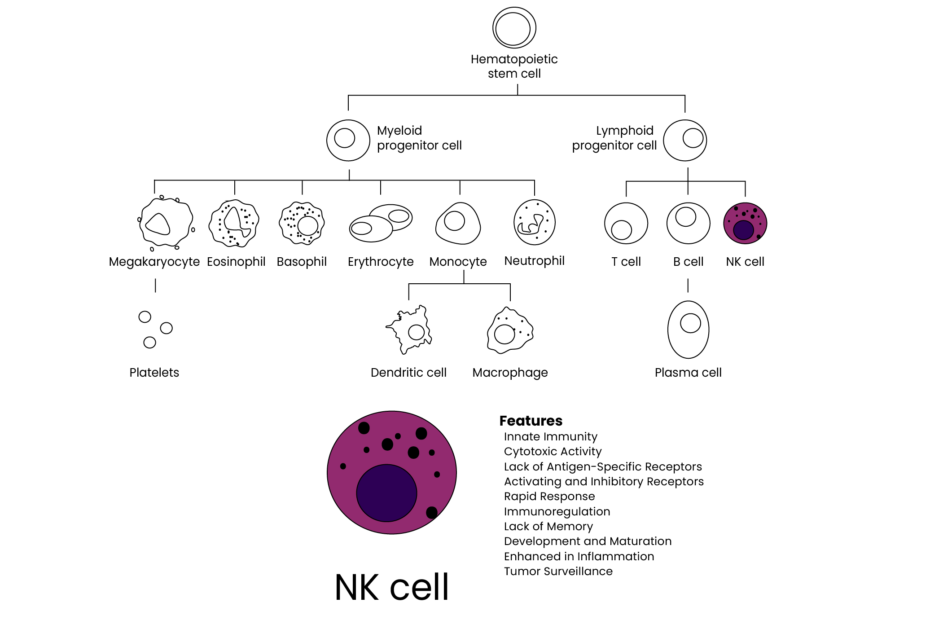While they may not have the fame of other immune cells like T-cells or macrophages, Natural Killer (NK) cells are, in their own way, the unsung heroes of our immune system. Far from being the most dangerous of cells, NK cells are essential players that help protect our bodies against infections, cancer, and other threats. In this blog post, we’ll delve into the fascinating world of NK cells and their vital roles in immune defense.
NK cells are a type of white blood cell that possesses a remarkable ability to identify and destroy infected or abnormal cells in the body. Unlike other immune cells that require specific markers or antigens to recognize their targets, NK cells use a more general approach. They have the unique capability to recognize cells that deviate from the body’s normal healthy cells by assessing the presence or absence of specific surface molecules.
One of the most significant aspects of NK cells is their ability to distinguish between healthy cells and those that have been compromised. When they detect a cell that doesn’t meet the body’s criteria for health, NK cells spring into action. They release cytotoxic molecules that puncture the membrane of the target cell, leading to its destruction.
NK cells are particularly vital in the body’s defense against viral infections and are also active in identifying and eliminating early-stage cancer cells. They act as a first line of defense, especially when the immune system is confronted with threats that haven’t yet triggered a specific immune response. Their ability to discern healthy from abnormal cells makes them invaluable in keeping us safe from both infections and cancer.
In summary, while NK cells might not be the most dangerous of cells, they are undoubtedly among the most vital. Their unique and finely tuned recognition mechanisms allow them to protect us from threats that would otherwise go unnoticed by the immune system. By acting as vigilant sentinels, NK cells play a crucial role in maintaining our health and well-being, making them indispensable heroes of our immune system.
Features:
- Innate Immunity: NK cells are a component of the innate immune system, meaning they do not require prior exposure to specific pathogens to recognize and attack infected or abnormal cells.
- Cytotoxic Activity: One of the primary functions of NK cells is to destroy target cells, such as virus-infected cells and early-stage cancer cells, through a process known as cytotoxicity. They release cytotoxic granules containing perforin and granzymes that puncture and induce apoptosis (cell death) in the target cells.
- Lack of Antigen-Specific Receptors: Unlike T cells, which have antigen-specific receptors, NK cells do not possess antigen receptors. Instead, they rely on a balance between activating and inhibitory receptors to distinguish between healthy and abnormal cells.
- Activating and Inhibitory Receptors: NK cells express a variety of activating and inhibitory receptors on their cell surface. Inhibitory receptors recognize major histocompatibility complex (MHC) molecules on healthy cells, while activating receptors interact with stress-induced ligands or other markers on infected or transformed cells.
- Rapid Response: NK cells are among the first immune cells to respond to infections and malignancies. They are known for their swift reaction to threats, making them a crucial component of the initial immune defense.
- Immunoregulation: NK cells also have a role in immune regulation. They can secrete cytokines, such as interferon-gamma, that influence the activities of other immune cells and help coordinate the immune response.
- Lack of Memory: NK cells do not form memory responses. Their function is immediate and not tied to immunological memory.
- Development and Maturation: NK cells originate in the bone marrow and undergo maturation processes there. Once fully developed, they circulate throughout the body, patrolling for threats.
- Enhanced in Inflammation: Inflammatory conditions, such as infections, can activate NK cells and increase their cytotoxic activity. They play a vital role in responding to acute infections.
- Tumor Surveillance: NK cells are important for immune surveillance against cancer. They can recognize and eliminate early cancer cells, contributing to cancer prevention.
- Viral Defense: NK cells are particularly effective against viral infections, as they can identify and eliminate virus-infected cells.
- Adaptive Immunity Interaction: NK cells can also interact with cells of the adaptive immune system, such as T cells and dendritic cells, to modulate and coordinate immune responses.
